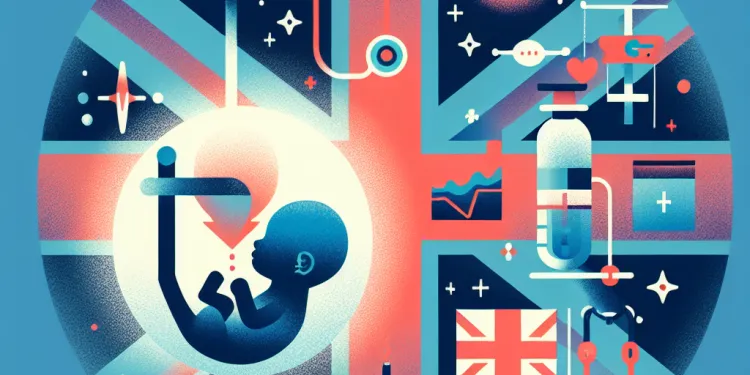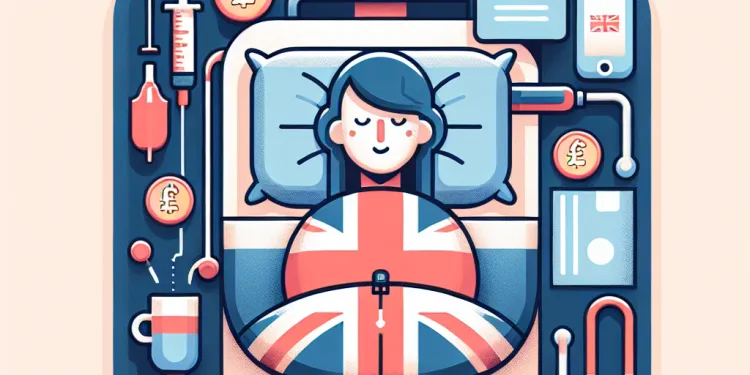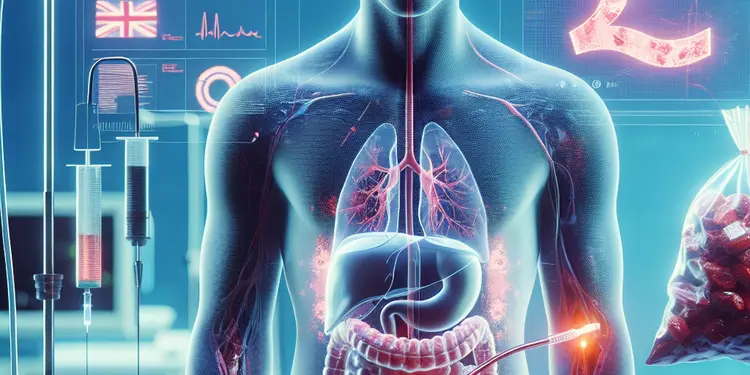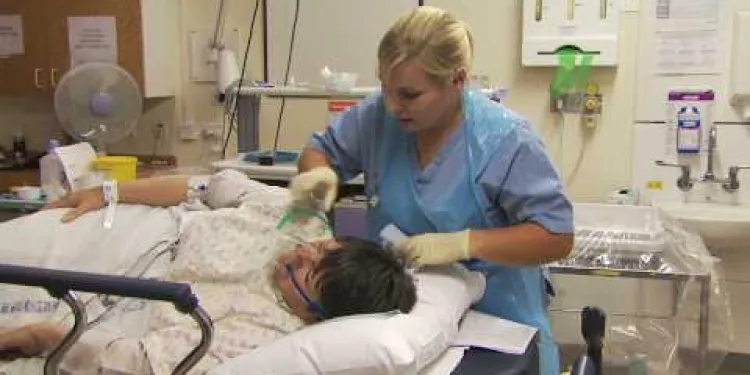
Find Help
More Items From Ergsy search
-

Is a C-section a common procedure in the UK?
Relevance: 100%
-

What are the risks associated with a C-section?
Relevance: 57%
-

Will I be awake during a C-section?
Relevance: 56%
-

Can my partner be present during the C-section?
Relevance: 53%
-

How should I prepare for a C-section?
Relevance: 52%
-

Are there any dietary restrictions before a C-section?
Relevance: 51%
-

How long will I stay in hospital after a C-section?
Relevance: 47%
-

What is the most common surgical procedure for BPH?
Relevance: 42%
-

How can I manage pain after a C-section?
Relevance: 38%
-

Anaesthetic procedure for elective caesarean section (C section)
Relevance: 37%
-

Can flesh-eating disease occur after common surgical procedures?
Relevance: 35%
-

Your Caesarean birth
Relevance: 35%
-

Endoscopy Procedures | Colonoscopy
Relevance: 34%
-

What is the recovery process like after a C-section?
Relevance: 34%
-

Will I feel pain during the procedure?
Relevance: 34%
-

Can a facelift be combined with other procedures?
Relevance: 32%
-

What are minimally invasive procedures for BPH?
Relevance: 31%
-

What is a Caesarean birth?
Relevance: 30%
-

Why might a Caesarean birth be necessary?
Relevance: 30%
-

What is the procedure for getting Turkey Teeth?
Relevance: 29%
-

How long does the Turkey Teeth procedure take?
Relevance: 27%
-

How long does it take to recover from a Caesarean birth?
Relevance: 27%
-

What is the procedure for receiving mail?
Relevance: 27%
-

Having an operation or procedure at the Royal Free London
Relevance: 27%
-

Can I check the waiting time for a specific procedure online?
Relevance: 27%
-

Bournemouth Digestive Diseases Centre: Endoscopy Procedure
Relevance: 27%
-

Bournemouth Digestive Diseases Centre: Gastroscopy Procedure (Subtitled)
Relevance: 27%
-

Having a Caesarean Section
Relevance: 24%
-

How can I maintain my Turkey Teeth after the procedure?
Relevance: 24%
-

Can I have a natural birth after a Caesarean section?
Relevance: 23%
-

How common is hypotony?
Relevance: 22%
-

What are the common uses of Botox?
Relevance: 21%
-

Can my partner be with me during the Caesarean section?
Relevance: 20%
-

What are the common side effects of spinal anaesthesia?
Relevance: 19%
-

What are the common side effects after a facelift?
Relevance: 19%
-

What is a common use of paracetamol?
Relevance: 19%
-

What are some common reasons blood transfusions are needed?
Relevance: 19%
-

Is thrombosis a common condition?
Relevance: 18%
-

What are common causes of shareholder disputes?
Relevance: 18%
-

Is tinnitus a common condition?
Relevance: 18%
Introduction to C-Sections
A Caesarean section, commonly referred to as a C-section, is a surgical procedure used to deliver a baby through incisions in the abdomen and uterus. This procedure is often performed when a vaginal delivery would put the mother or baby at risk. C-sections can be planned in advance or performed in response to an unforeseen complication during childbirth.
Prevalence of C-Sections in the UK
C-sections are a relatively common procedure in the United Kingdom. According to statistics from the NHS, approximately 25% to 30% of all births in the UK are delivered via C-section. This rate has seen a gradual increase over the past few decades due to various factors such as maternal age, multiple pregnancies, and advancements in surgical safety.
Reasons for C-Section Deliveries
There are multiple reasons why a C-section might be recommended by healthcare professionals. Common medical indications include situations where the baby is in a breech position, labor isn't progressing as expected, or there is concern about the baby's health. Additionally, maternal health issues like high blood pressure or infections such as HIV may necessitate a C-section.
Furthermore, elective C-sections are also becoming more prominent, where a mother may choose this method of delivery for personal or medical reasons, even when vaginal birth is possible.
Planned vs. Emergency C-Sections
C-sections are categorized into elective (planned) and emergency procedures. Planned C-sections are scheduled in advance when certain risk factors are identified. On the other hand, emergency C-sections are performed when unexpected complications arise during labor, such as fetal distress or uterine rupture, necessitating immediate intervention for the safety of both mother and child.
Pros and Cons of C-Section Delivery
Like any surgical procedure, C-sections come with their own set of advantages and disadvantages. On the positive side, they can prevent potential complications associated with high-risk pregnancies and allow for a controlled and scheduled delivery. However, they also involve longer recovery periods and increased risks of infection, blood loss, and potential implications for future pregnancies.
Conclusion
In conclusion, C-sections are a common and generally safe procedure practiced widely across the UK. With ongoing advancements in medical technology and surgical techniques, C-sections have become safer, ensuring that both mothers and babies receive the care they need when a vaginal birth is not feasible. Nonetheless, it remains crucial for expectant mothers to discuss with their healthcare providers the most suitable delivery method based on their individual health needs and circumstances.
What is a C-Section?
A C-section is a surgery to help a baby come out. The doctor makes cuts in the mom's tummy and uterus to deliver the baby. This happens when it's not safe for the mom or baby to have a normal birth. Sometimes, C-sections are planned before the baby is born, and sometimes they happen if there are problems during birth.
How Common are C-Sections in the UK?
C-sections are quite common in the UK. About 25% to 30% of all babies are born this way. This number has gone up over the years for reasons like moms having babies at an older age, having more than one baby, and better surgery methods.
Why Do Some People Have C-Sections?
Doctors might say a C-section is needed for several reasons. Some reasons include if the baby is not positioned right, if the birth is taking too long, or if the baby’s health is in danger. Also, if the mom has health issues like high blood pressure or certain infections, a C-section might be safer.
Some mommies choose to have a C-section even when they could have a normal birth. They might do this for personal reasons or if advised by their doctor.
Planned or Emergency C-Sections
There are two main types of C-sections: planned and emergency. Planned C-sections are arranged before the birth when there are known risks. Emergency C-sections happen suddenly during birth if there are problems like the baby is in distress, and quick action is needed.
Good and Bad Sides of C-Sections
C-sections have good and bad points. On the good side, they can stop problems during risky births and allow for a scheduled delivery. On the downside, they take longer to heal and can have risks like infections or more bleeding. They can also affect future pregnancies.
Summary
C-sections are a safe and common way to have babies in the UK. Thanks to new medical technology, they are getting safer. It is important for moms-to-be to talk to their doctors about the best way to give birth based on their health and needs.
Frequently Asked Questions
What is a C-section?
A C-section, or cesarean section, is a surgical procedure used to deliver a baby through incisions in the abdomen and uterus.
Is a C-section a common procedure in the UK?
Yes, C-sections are a common procedure in the UK, with approximately 25-30% of births occurring via cesarean delivery.
Why might a C-section be performed?
A C-section may be performed for various reasons, including fetal distress, breech position, multiple births, or health risks to the mother.
Are C-sections planned or unplanned?
C-sections can be either planned (elective) or unplanned (emergency) depending on the circumstances of the pregnancy.
How long does a C-section typically take?
A C-section generally takes about 45 to 60 minutes to perform.
What is the recovery time for a C-section?
Recovery from a C-section can take approximately 6 to 8 weeks, but it varies from person to person.
Are there specific guidelines for C-sections in the NHS?
Yes, the NHS follows specific clinical guidelines to determine when a C-section may be necessary.
Can mothers request a C-section in the UK?
Mothers in the UK can request a C-section, but it is typically granted based on medical necessity or after discussion with healthcare professionals.
Are there risks associated with C-sections?
Like any surgery, C-sections carry risks such as infection, bleeding, or complications from anesthesia.
Is there a difference in recovery between a C-section and a natural birth?
Yes, recovery from a C-section can be longer and more challenging than from a natural birth due to the surgical nature of the procedure.
How is pain managed after a C-section?
After a C-section, pain is typically managed with medications such as paracetamol, ibuprofen, or stronger analgesics if needed.
Are there special concerns for future pregnancies after a C-section?
Yes, having a C-section can affect future pregnancies, including the potential for uterine rupture, and many doctors discuss options like VBAC (Vaginal Birth After Cesarean).
What are the benefits of a planned C-section?
Planned C-sections can offer benefits like avoiding potential complications of labor, and scheduling convenience, but they are typically considered for specific medical reasons.
Can I have a C-section if I had one previously?
Yes, women who have had a previous C-section can have another one, although options for a vaginal birth after cesarean (VBAC) may also be considered.
What type of anesthesia is used during a C-section?
C-sections are commonly performed with regional anesthesia, such as a spinal block or an epidural, to keep the mother awake and comfortable without feeling pain.
How does a C-section affect the newborn's health?
Most babies born via C-section are healthy, but there may be an increased risk of breathing difficulties if the procedure is performed before 39 weeks without a medical reason.
What support is available after a C-section in the UK?
In the UK, postnatal care including hospital stay, home visits by midwives, and information on recovery and newborn care is typically provided after a C-section.
How does the rate of C-sections in the UK compare internationally?
The rate of C-sections in the UK is similar to many developed countries but lower than places with higher elective C-section rates, such as Brazil or the United States.
Can complications arise from multiple C-sections?
Yes, multiple C-sections can increase the risk of certain complications like placental problems, adhesions, and uterine rupture.
How are C-section incisions closed?
C-section incisions are typically closed with sutures or staples, both of which are effective in promoting healing.
What is a C-section?
A C-section is short for Caesarean section. It is when a baby is born not through the usual way but through a cut in the mom’s belly. Doctors help to take the baby out this way.
Sometimes, this is safer for the baby or the mom.
If you find reading hard, it can help to:
- Ask someone to read with you.
- Use audiobooks to listen instead of reading.
- Use apps that read text out loud.
A C-section, or cesarean section, is an operation doctors use to help a baby be born. The doctor makes cuts in the mom's tummy and the part inside where the baby grows.
Do many people in the UK have C-sections?
A C-section is when a baby is born through a cut in the mom's belly. Lots of moms in the UK have C-sections.
If you want to know more, you can talk to a doctor or a nurse. They can help you understand better.
Yes, C-sections happen a lot in the UK. About 25-30 out of every 100 births are done this way.
Why might a C-section be done?
A C-section is an operation to help a baby be born.
Doctors might do a C-section if:
- The baby is not coming out the normal way.
- The baby is in danger.
- The mom is in danger.
Doctors and nurses will help the mom and baby during a C-section.
If you want to learn more, ask your doctor or a nurse. They can explain more to help you understand.
A C-section is a way to help a baby be born. Doctors might do this for different reasons. It might happen if the baby is not okay, if the baby is upside down, if there is more than one baby, or if the mom’s health is at risk.
- Try to read slowly and out loud.
- Use your finger or a ruler to keep your place.
- Ask someone to help if you have questions.
Do doctors plan C-sections?
C-sections are a type of surgery to help deliver a baby. Sometimes, doctors plan to do a C-section; this is called planned. Other times, they have to do it quickly because of an emergency; this is called unplanned.
How long does a C-section usually take?
A C-section is an operation to help a baby be born. It usually takes about 45 minutes to 1 hour.
How long does it take to feel better after a C-section?
A C-section is a surgery to help a baby be born. It takes time to feel better after this surgery.
Most people start feeling better after 6 weeks. But everyone is different.
Here are some ways to help you feel better:
- Rest as much as you can.
- Ask for help from family or friends.
- Eat healthy food and drink lots of water.
- Be gentle with your body.
- Follow your doctor's advice.
After a C-section, it takes about 6 to 8 weeks to feel better, but everyone is different.
What are the NHS rules for C-sections?
Yes, the NHS has special rules to help decide when someone might need a C-section.
Can mums ask for a C-section in the UK?
A C-section is when doctors cut open a mum's tummy to help the baby come out. This is sometimes needed for health reasons. In the UK, mums can ask for a C-section. Talk to your doctor or midwife if you want one. They will explain what’s best for you and your baby.
If reading is hard, using pictures or asking someone to read with you can help. It's also okay to ask lots of questions to understand better.
Mums in the UK can ask to have a C-section. A C-section is an operation to help deliver the baby. Doctors or nurses will talk to the mum to see if it is needed for health reasons.
Are C-sections risky?
Having a C-section (a type of surgery to help a baby be born) can have some risks. Risks mean things that might go wrong.
Here are some things that could happen:
- You might get an infection (germs that make you sick).
- You could lose a lot of blood.
- You might feel pain after the surgery.
Always talk to your doctor or nurse if you have questions. They know how to help you. It can also help to have a friend or family member with you.
Using pictures or videos can make it easier to understand.
A C-section is a kind of surgery to help a baby be born. Like all surgeries, there are some risks involved. These risks can include getting an infection, having too much bleeding, or problems with the medicine used to make you sleepy during the surgery.
To better understand this information, you can:
- Ask your doctor to explain things clearly
- Bring a friend or family member to listen and help you remember
- Use pictures or videos to see how a C-section works
Is getting better different after C-section and natural birth?
Yes, getting better after a C-section and natural birth can be different.
C-section: This is an operation to have a baby. It might take longer to feel better. You need more rest and may have a scar.
Natural birth: This is when the baby comes out through the birth canal. You might feel better faster and have less pain.
Helpful tools:
- Ask a doctor or nurse for advice.
- Use pillows for comfort.
- Take it easy and rest.
After a C-section, it can take more time to feel better compared to a normal birth. This is because a C-section is an operation.
How do doctors help with pain after a C-section?
A C-section is when a baby is born by surgery. After the surgery, moms might feel pain. Doctors want to help with this pain.
Here are some ways doctors can help:
- Medicine: Doctors give special medicine to stop the pain. It can be pills or sometimes through a needle.
- Rest and Relaxation: Moms need to rest a lot. Relaxing helps the body get better.
- Support: Asking family or friends for help is important. They can help moms move around or do things at home.
- Healthy Food: Eating good food helps the body heal faster.
If the pain does not go away, it is important to tell the doctor.
After having a C-section, you might feel some pain. Doctors usually give medicines to help. These could be paracetamol, ibuprofen, or stronger pain pills if you need them.
If reading is hard, you can ask someone to read it to you, or use apps that read text out loud. Try taking breaks when reading to make it easier.
Will there be any problems for future babies after a C-section?
Yes, having a C-section can change future pregnancies. There might be a small chance of a tear in the womb. Doctors often talk about other choices, like having a natural birth after a C-section, called VBAC (Vaginal Birth After Cesarean).
What are the good things about planning a C-section?
Having a planned C-section can be good because it helps avoid problems that might happen during labor. It also lets you pick a time for the baby's birth. But, doctors usually suggest planned C-sections for special medical reasons.
Can I have another C-section?
If you had a C-section before, you might have one again. Your doctor can help you decide.
It's a good idea to talk to your doctor. They can tell you what is best for you and your baby.
Here are some tips to help you understand:
- Ask questions if you don't understand.
- Have someone with you to help remember what the doctor says.
- Use simple words to talk about your worries.
Yes, women who had a C-section before can have another C-section. They might also think about having a regular birth, called a VBAC.
What kind of medicine do doctors use to stop pain during a C-section?
A C-section is when doctors help a baby come out of a mom's tummy.
Doctors use special medicine so the mom doesn't feel pain. This is called anesthesia.
There are two common types:
- Spinal Block: This medicine goes into the back and makes the tummy feel no pain but the mom is awake.
- Epidural: This is similar to a spinal block but can be adjusted during the surgery.
Sometimes, if needed, doctors use:
- General Anesthesia: This makes the mom sleep during the operation.
Talk to your doctor to find out what is best for you. You can ask a family member or friend to be with you for support.
There are ways to get help:
- Ask questions if you don’t understand.
- Watch videos that show what happens.
- Use pictures to understand more.
C-sections usually use special medicine to make the mom comfortable. This medicine is called regional anesthesia, like a spinal block or an epidural. It helps the mom stay awake but not feel any pain.
How does a C-section affect a baby's health?
A C-section is an operation to help a baby be born. It is when doctors make a cut in the mom's belly.
Here is how a C-section might affect a baby's health:
- Breathing: Some babies may have problems breathing for a little while after being born this way, but doctors can help them.
- Infections: C-section babies might be more likely to get infections, but doctors and nurses watch them closely.
- Immune system: A baby's immune system might be different because they didn't pass through the birth canal, but they usually grow strong and healthy.
To help understand more, use pictures or ask someone to explain things when you have questions.
Most babies born through a C-section are healthy. But if the C-section happens before 39 weeks for no important medical reason, the baby might have more trouble breathing.
What help can you get after a C-section in the UK?
A C-section is when doctors help a baby come out of the tummy.
Here are some ways to get help after a C-section:
- Midwives or nurses can visit you to check how you are doing.
- Family and friends can help with taking care of the baby and chores.
- There are groups for new mums where you can ask questions and share stories.
- Doctors can give you advice on how to feel better and heal.
Use things that make tasks easier, like pillows to sit comfortably or tools to pick up things without bending.
In the UK, after having a baby by C-section, mums get care. This includes staying in the hospital, visits at home by nurses called midwives, and help with feeling better and looking after the new baby.
How does the number of C-sections in the UK compare to other countries?
A C-section is a type of surgery to help a baby be born.
We can look at the number of C-sections to see if the UK has more or less than other countries.
You can use pictures and charts to make this easier to understand.
The number of C-sections in the UK is about the same as in other countries like it. But, it is not as high as in countries like Brazil or the United States, where there are more C-sections just because people choose to have them.
Can problems happen with having many C-sections?
Having many C-sections can sometimes cause problems. It's important to talk to your doctor about it. They can help you understand what might happen and how to stay healthy.
Some ways to get more help are:
- Ask your doctor questions.
- Write down what your doctor says.
- Bring a friend or family member to talk to the doctor with you.
Yes, having more than one C-section can make some problems more likely. These problems can include issues with the placenta, scar tissue, and the womb tearing.
How do doctors close cuts after a C-section?
After a C-section, doctors close the cut on your tummy. They use stitches or small metal clips. Both ways are good for helping your body heal.
Useful Links
This website offers general information and is not a substitute for professional advice.
Always seek guidance from qualified professionals.
If you have any medical concerns or need urgent help, contact a healthcare professional or emergency services immediately.
- Ergsy carfully checks the information in the videos we provide here.
- Videos shown by Youtube after a video has completed, have NOT been reviewed by ERGSY.
- To view, click the arrow in centre of video.
- Most of the videos you find here will have subtitles and/or closed captions available.
- You may need to turn these on, and choose your preferred language.
- Go to the video you'd like to watch.
- If closed captions (CC) are available, settings will be visible on the bottom right of the video player.
- To turn on Captions, click settings .
- To turn off Captions, click settings again.
More Items From Ergsy search
-

Is a C-section a common procedure in the UK?
Relevance: 100%
-

What are the risks associated with a C-section?
Relevance: 57%
-

Will I be awake during a C-section?
Relevance: 56%
-

Can my partner be present during the C-section?
Relevance: 53%
-

How should I prepare for a C-section?
Relevance: 52%
-

Are there any dietary restrictions before a C-section?
Relevance: 51%
-

How long will I stay in hospital after a C-section?
Relevance: 47%
-

What is the most common surgical procedure for BPH?
Relevance: 42%
-

How can I manage pain after a C-section?
Relevance: 38%
-

Anaesthetic procedure for elective caesarean section (C section)
Relevance: 37%
-

Can flesh-eating disease occur after common surgical procedures?
Relevance: 35%
-

Your Caesarean birth
Relevance: 35%
-

Endoscopy Procedures | Colonoscopy
Relevance: 34%
-

What is the recovery process like after a C-section?
Relevance: 34%
-

Will I feel pain during the procedure?
Relevance: 34%
-

Can a facelift be combined with other procedures?
Relevance: 32%
-

What are minimally invasive procedures for BPH?
Relevance: 31%
-

What is a Caesarean birth?
Relevance: 30%
-

Why might a Caesarean birth be necessary?
Relevance: 30%
-

What is the procedure for getting Turkey Teeth?
Relevance: 29%
-

How long does the Turkey Teeth procedure take?
Relevance: 27%
-

How long does it take to recover from a Caesarean birth?
Relevance: 27%
-

What is the procedure for receiving mail?
Relevance: 27%
-

Having an operation or procedure at the Royal Free London
Relevance: 27%
-

Can I check the waiting time for a specific procedure online?
Relevance: 27%
-

Bournemouth Digestive Diseases Centre: Endoscopy Procedure
Relevance: 27%
-

Bournemouth Digestive Diseases Centre: Gastroscopy Procedure (Subtitled)
Relevance: 27%
-

Having a Caesarean Section
Relevance: 24%
-

How can I maintain my Turkey Teeth after the procedure?
Relevance: 24%
-

Can I have a natural birth after a Caesarean section?
Relevance: 23%
-

How common is hypotony?
Relevance: 22%
-

What are the common uses of Botox?
Relevance: 21%
-

Can my partner be with me during the Caesarean section?
Relevance: 20%
-

What are the common side effects of spinal anaesthesia?
Relevance: 19%
-

What are the common side effects after a facelift?
Relevance: 19%
-

What is a common use of paracetamol?
Relevance: 19%
-

What are some common reasons blood transfusions are needed?
Relevance: 19%
-

Is thrombosis a common condition?
Relevance: 18%
-

What are common causes of shareholder disputes?
Relevance: 18%
-

Is tinnitus a common condition?
Relevance: 18%


